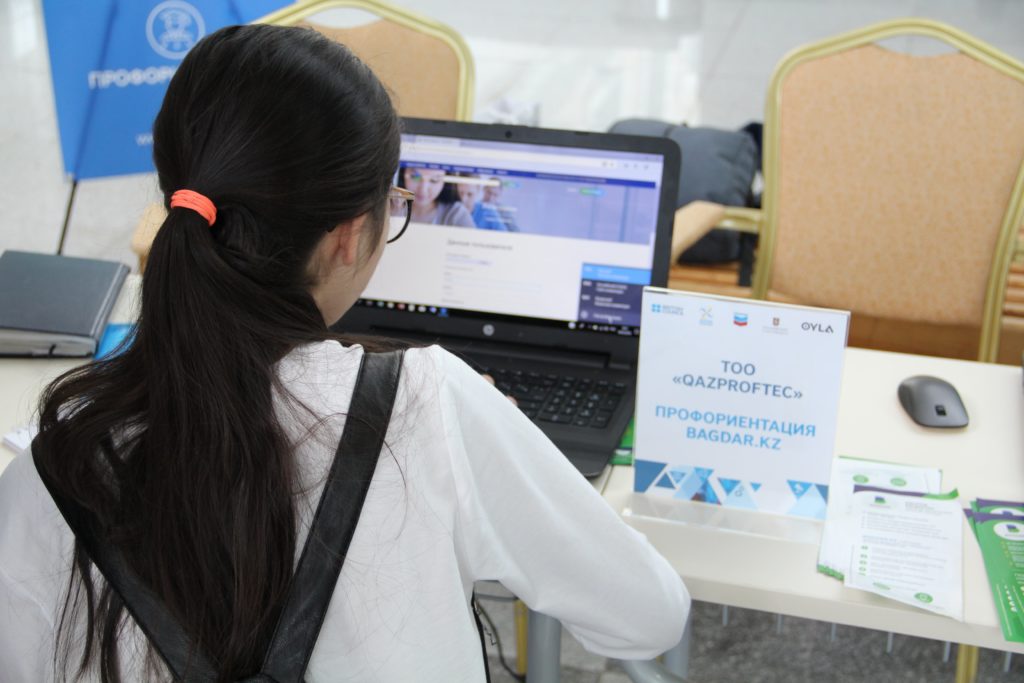ASTANA – The Bagdar (Guidance) project is a unified information system offering career advice and forecasting and analysing labour force demand. Initiated by researchers in 2016, it aims to build on the talent inherited in every person and improve his or her quality of life.
The project targets a broad social audience of different ages and social status – students, entrants, parents, educational institution graduates, those who are working and the unemployed, said its head Aslanbek Zhakupov in an interview with The Astana Times.
Bagdar also focuses on career advice centre professionals, students’ career advice and self-determination consultants, curators and high school class leaders, secondary education institution psychologists and parents.
“The portal could also be useful for comprehensive schools, technical and vocational educational institutions, universities, employment centres, human resources departments of various organisations and enterprises, and training and educational centres, as well as centres for professional development,” said Zhakupov.
He noted the project’s current achievements.
“As part of the agreement with the employment centre of Astana Akimat, 2,383 ninth grade students underwent on-site vocational guidance testing conducted in Russian and Kazakh. Consultations were provided for schoolchildren and an analytical report illustrating the tendency of the prevailing career preferences were provided for the employment centres,” he added.
Bagdar offers career guidance, education and employment.
“So far, the project was tested in the online mode as career advising for 9th and 11th grade students. We are currently finalising the test complexes for schoolchildren in 5th-8th grades in addition to the tests for the adult population wishing to change their career path, retrain or upgrade their skills,” said Zhakupov.
A mathematical model for forecasting the most in-demand professions is being completed and will be provided in an accessible form on the website. The process combines a full range of information services for career advice, opportunities for higher and secondary specialised education and professional courses.
“The portal operates in a systemic and logically interconnected trajectory. One has an opportunity to take career advising tests and receive a report and career recommendations. The website also provides information on available vacancies in different professions and regions,” he added.
Profesiograms offer information on most occupations, their requirements, working conditions and contra-indications of certain professions.
“Clients of the portal can watch videos with professionals who talk about the pros and cons of their professions and those who share their experience in making the right professional choice. Portal users can also enjoy the video reports and reviews from various events, seminars and forums,” he said.
The project also provides information about Kazakh higher education institutions and colleges, including programmes, departments and learning processes. Job seekers can upload their resumes, while employers post vacancies.
The website is developing a mobile version which will allow clients to navigate career services and job vacancies at their convenience, thereby reducing the time for job searches.
“We plan to collect as much information as possible on higher and technical vocational education services and short-term, non-licensed programmes both in Kazakhstan and the CIS (Commonwealth of Independent States). We provide information and advice on obtaining a professional education. The portal’s users and visitors of different age groups can get information about educational institutions, choose the suitable programme courses and apply to an educational institution,” said Zhakupov.
“We plan to develop additional free and paid services not only on the online platform. Our goal is to combine services to commercialise our activities in order to be able to conduct new research after the grant finishes,” he said.
This year, Bagdar applied to the Eurasian Digital Platform competition organised by the Eurasian Economic Commission (EEC) to create a single labour exchange, labour migration and career services monitoring and forecasting.
“Although we did not get support for the expansion of our services for the five [Eurasian Economic Union] countries, we will continue to work in this direction using our own resources,” said Zhakupov.
Bagdar, part of the Stimulation of Productive Innovation project, operates under the grant programme to support commercialising technological innovation. Its current publication is financed by the project and supported by the World Bank and the Kazakh government.


